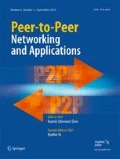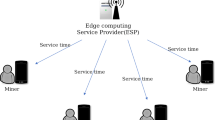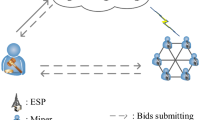Abstract
Blockchain can provide a dependable environment for mobile applications. Mining, as an important component in blockchain, requires a lot of computing resources, and hence resource limited moblie devices are unable to perform the mining. Offloading mining computation tasks to an edge computing service provider (ESP) or a cloud computing service provider (CSP) is considered as a feasible solution to mobile blockchain mining. However, the computing resources of the ESP are not unlimited. Therefore, rational edge computing resource management is critical to maximizing the utilities of the ESP and the miners. Most of the existing work assumes the computation is offloaded to either the CSP or the ESP which serves the terminal devices. However, an ESP can also offload the computation to the other ESPs, when the ESP is overloaded. In this paper, we construct a computation offloading model composed of multiple miners, multiple ESPs, and a CSP, where an overloaded ESP can offload the mining tasks to the CSP or the other ESPs or both. We propose a three-stage Stackelberg game for optimal pricing-based edge computing resource management. We analyze the existence and uniqueness of Stackelberg game equilibrium and derive the optimal amount of computing resource requests from the miners. We then propose a simple yet effective golden section based Stackelberg game equilibrium searching algorithm SES for resource pricing. We conduct experiments through simulations. Experimental results show that the proposed computing offloading model and algorithm can achieve high unit service utilities of both the ESPs and the terminal devices.











Similar content being viewed by others
References
Blockchain for enterprise applications. https://www.tractica.com/research/blockchain-for-enterprise-applications(2018)
Dorri A, Kanhere SS, Jurdak R (2016) Blockchain in Internet of Things: Challenges and solutions. arXiv:1608.05187
Rawat DB, Alshaikhi A (2018) Leveraging distributed blockchain-based scheme for wireless network virtualization with security and QoS constraints. In: 2018 International Conference on Computing, Networking and Communications (ICNC). IEEE, pp 332–336
Suankaewmanee K, Hoang DT, Niyato D, Sawadsitang S, Wang P, Han Z (2018) Performance analysis and application of mobile blockchain. In: 2018 International Conference on Computing, Networking and Communications (ICNC). IEEE, pp 642–646
Jiao Y, Wang P, Niyato D, Xiong Z (2018) Social welfare maximization auction in edge computing resource allocation for mobile blockchain. In: 2018 IEEE International Conference on Communications (ICC), pp 1–6
Casado-Vara R, de la Prieta F, Prieto J, Corchado JM (2018) Blockchain framework for IoT data quality via edge computing. In: Proceedings of the 1st Workshop on blockchain-enabled networked sensor systems, pp 19–24
Chamarajnagar R, Ashok A (2018) Opportunistic mobile IoT with blockchain based collaboration. In: 2018 IEEE Global Communications Conference (GLOBECOM), pp 1–6
Kang J, Yu R, Huang X, Wu M, Maharjan S, Xie S, Zhang Y (2019) Blockchain for secure and efficient data sharing in vehicular edge computing and networks. IEEE Internet of Things Journal 6(3):4660–4670
Kim JY, Moon SM (2018) Blockchain-based edge computing for deep neural network applications. In: Proceedings of the workshop on intelligent embedded systems architectures and applications, pp 53–55
Kroll JA, Davey IC, Felten EW (2013) The economics of Bitcoin mining, or Bitcoin in the presence of adversaries. In: Proceedings of WEIS, p 11
Sompolinsky Y, Lewenberg Y, Bachrach Y, Zohar A, Rosenschein JS (2015) Bitcoin mining pools: A cooperative game theoretic analysis. In: Proceedings of the 2015 International conference on autonomous agents and multiagent systems, pp 919–927
Houy N (2016) The Bitcoin mining game. Ledger 1:53–68
Xiong Z, Feng S, Niyato D, Wang P, Han Z (2018) Optimal pricing-based edge computing resource management in mobile blockchain. In: 2018 IEEE International Conference on Communications (ICC), vol 05, pp 1–6
Zhang H, Xiao Y, Bu S, Niyato D, Yu FR, Han Z (2017) Computing resource allocation in three-tier IoT fog networks: A joint optimization approach combining Stackelberg game and matching. IEEE Internet of Things J 4(5):1204–1215
Chiu J, Koeppl T (2019) Incentive compatibility on the blockchain. In: Social design. Springer, pp 323–335
Luong NC, Xiong Z, Wang P, Niyato D (2018) Optimal auction for edge computing resource management in mobile blockchain networks: A deep learning approach. In: 2018 IEEE International Conference on Communications (ICC). IEEE, pp 1–6
Jiao Y, Wang P, Niyato D, Suankaewmanee K (2019) Auction mechanisms in cloud/fog computing resource allocation for public blockchain networks. In: IEEE Transactions on parallel and distributed systems
Liu M, Yu FR, Teng Y (2018) Computation offloading and content caching in wireless blockchain networks with mobile edge computing. IEEE Trans Veh Technol 67(11):11008–11021
Wu Y, Chen X, Shi J, Ni K, Qian L, Huang L, Zhang K (2018) Optimal computational power allocation in multi-access mobile edge computing for blockchain. Sensors 18(10):3472
Fan Y, Shen G, Jin Z, Hu D, Shi L, Yuan X (2020) Stackelberg game based edge computing resource management for mobile blockchain. ACM Turing Celebration Conference - China (ACM TURC’20)
Author information
Authors and Affiliations
Corresponding author
Additional information
Publisher’s note
Springer Nature remains neutral with regard to jurisdictional claims in published maps and institutional affiliations.
This article belongs to the Topical Collection: Special Issue on Privacy-Preserving Computing
Guest Editors: Kaiping Xue, Zhe Liu, Haojin Zhu, Miao Pan and David S.L. Wei
This work was partly supported by the National Natural Science Foundation of China under Grant U1836102.
Rights and permissions
About this article
Cite this article
Fan, Y., Jin, Z., Shen, G. et al. Three-stage Stackelberg game based edge computing resource management for mobile blockchain. Peer-to-Peer Netw. Appl. 14, 1431–1445 (2021). https://doi.org/10.1007/s12083-020-01032-y
Received:
Accepted:
Published:
Issue Date:
DOI: https://doi.org/10.1007/s12083-020-01032-y




